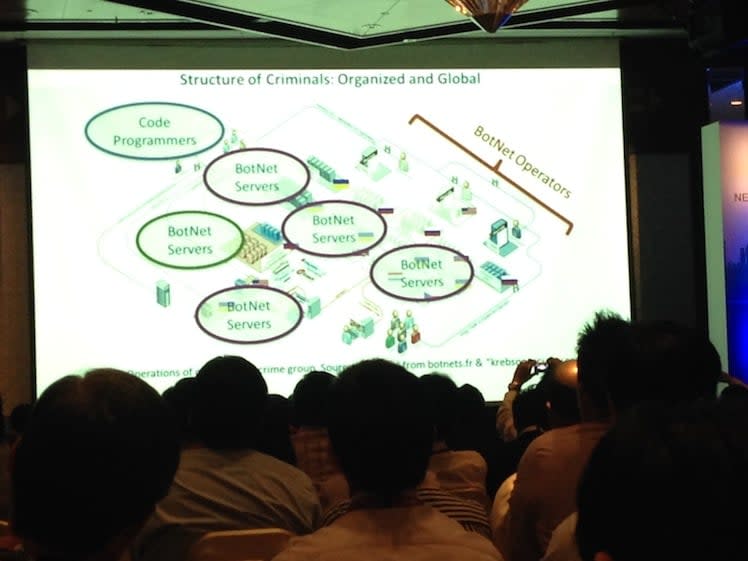How is INTERPOL leading the fight against cybercrime?
Tech is a boon, but cyber criminals have turned it into a dangerous weapon. INTERPOL’s James Pang reveals how they are battling the epidemic
INTERPOL’s James Pang delivering keynote speech at NEC Innovative Solutions Fair 2014
James Pang’s keynote presentation at NEC Innovative Solutions Fair 2014 can be likened to watching a riveting crime thriller movie. The Assistant Director of INTERPOL‘s Digital Crime Investigative Support Sub-Doctorate spoke of organised crime and technologies used to catch elusive, villainous criminals, as the attendees sat on the edge of their seats.
Before Pang started sharing more about operations with special code names and huge syndicates, he played an informative video which summarised what INTERPOL, the International Criminal Police Organisation, is all about. A global alliance to fight cybercrime, the inter-governmental organisation facilitates police co-operation in 190 countries; it was first established in 1923 and later adopted ‘INTERPOL’ as its common name in 1956.
As the video played on the screen, one scene was particularly memorable. “What is the purpose of your trip?” asked a customs officer, almost too casually. However, on her screen, viewers could see that the passport scanned was labelled ‘stolen’ and the man was subsequently arrested on the spot.
Pang then delved deeper into organised crime, which includes terrorism, illegal gambling, human trafficking, drug trafficking, money laundering and counterfeiting. These criminal activities are traditionally committed in the real world. One example would be exchanging stolen cash with casino chips, which are then converted into ‘clean’ cash.
Read also: Arguments for and against the Philippine Cybercrime Law
The elusive world of cybercrime
However, such crimes have moved into the cyberspace. Pang noted that INTERPOL has seen a “huge rise of sales of illegal pharmaceutical drugs”, and “money mules receiving stolen money via internet banking”.
According to the 2013 Norton Report, which surveyed 13,022 online adults across 24 countries, cybercrime has costed consumers US$113 billion, and approximately US$378 per victim. Of course, such crimes are inherently transnational and difficult to investigate, but through the various operations INTERPOL carries out, organised crime rates might have a good chance at being reduced.
“I think the days of robbers physically robbing a bank are over,” said Pang, as he shared several case studies with the attendees. In one case, one group within a criminal syndicate is assigned to adapting malware to local banking websites. Internet banking users would then inadvertently and unwittingly downloaded the malware, open a page which looks exactly like the banking website they were directed from, and log in with their user id, password and soft token for second party authentication. “Someone is operating this malware from some other part of the world and making unauthorised money transfers,” he added.
Money mules
But to whom do these transfers go? Well, here’s the exciting nugget of information. Through advertising jobs online, many people fall prey to exploitation of money mules. All these people have to do is sign up with their internet banking numbers, withdraw the cash from ATM machines and remit the money to other parts of the world. Well, it’s not exactly an exploitation; these mules get to keep a small percentage of the total sum remitted. Pang added that many of these mules are housewives.
In the aforementioned case study, the investigation led revealed that the internet data for the phising incident was transmitted from Russia. The IP addresses of the money mules, on the other hand, was linked to the UK. This does not mean that the people transferring the money are truly in the UK; it could be a redirecting guise with the help of virtual private networks (VPN). In fact, these money mules used Western Union to remit money to mules in Tajikistan – yet another pawn down the chain.
Given its enormity, removing one player or a piece of the criminal framework will not neutralise the syndicate.

The layers INTERPOL has to get through before it hits the masterminds
Another case study which Pang shared during the presentation was one which involved US$45 million being withdrawn from ATM machines on two separate occasions from December 2012 to February 2013. Counterfeit cards with data from two banks in the Middle East were created to empty the financial institutions. Pang also concluded that the cyber heist saw surgical precision of criminals, an emphasis of the global breadth which crimes can take place in, and the speed of execution that the hackers were working with.
Internet and drug trafficking
In addition to cybercrime revolving around hacking banks and consumer accounts, the trade and distribution of illegal drugs was rampantly accelerated through the advent of the internet. INTERPOL’s Operation Pangea was precisely what was needed to counter it. First launched in 2008 where there were only 10 countries participating together, it reported 99 countries on board for 2013′s Operation Pangea VI.
Held in June 2013, Operation Pangea VI saw 10.1 million illegal and counterfeit pills confiscated amounting to an estimated value of US$36 million, more than 13,700 websites being shut down, 41,000 packages confiscated and 213 individuals under investigation or arrest for various criminal activities.
Read also: 2011 was the “Year of the Hacktivist” according to Verizon
“No single country can fight it alone,” said Pang, who emphasised the importance of a global alliance. He also noted that there are several factors which can deter detection of such criminal activities online. The list includes:
A lack of proactive cooperation and intelligence sharing between countries
Difficulty in tracing criminals over the internet
Delays in acquiring mutual legal assistance
But he was optimistic that INTERPOL will continue to be the force behind stopping perpetrators from carrying out crimes through the internet. In fact, it will be through the very tool these criminals abuse — technology — that the inter-governmental group will put a stop to cybercrime.
The post How is INTERPOL leading the fight against cybercrime? appeared first on E27.



